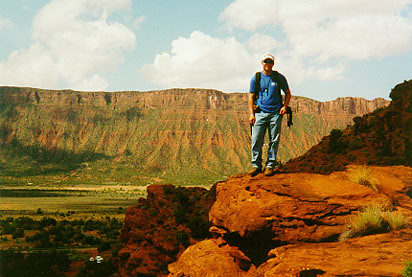

An article in the Winter 2011 AGI GeoSpectrum magazine caught my attention. It was a summary of a discussion on the AIPG LinkedIn group about the importance of a geology fieldcamp in your education. I can’t say I was surprised, but one comment caused me a little dissappointment:
Field camp separates us from the engineers.
I think I understand where the comment is coming from, I would probably agree that most civil geotechnical engineers don’t have any kind of field geology course, or any kind of field investigation course. But there are many geological engineers out there like me that do have some field background, and it is a tremendous advantage in engineering analysis and design to be trained to look at a site with a more critical eye and try to puzzle out the history and deposition…But I digress. Check out the article for more info. It was nice to see some very passionate comments from my old structural geology professor at the U of A (and one of my favorite all-time professors), George Davis (yep, the George Davis from the Davis and Reynolds Structural Geology textbook). If the direct link below doesn’t take you there, scroll down to page 22. [Source: AGI GeoSpectrum January 2011 Issue, Page 22 via Arizona Geology Blog. Image: Randy Post]



I really enjoy your daily blogs and was a little surprised to see my quote referenced in today’s blog. I stick by my comment, although I realize that there are probably quite a few acceptations to my very generalized quote. In my experience, many recent graduates entering the field of geotechnical engineering have little to no field experience. Using a landslide analogy, I have worked with people in the past who understand how to model landslide stability, how to determine soil and bedrock properties, and how to design slope mitigation. The thing I keep running into is a lack of ability to understand the landslide in the field. Often the morphology of a slide and engineering geologic aspects are not recognized. Geologic Engineers most often do not fit into this category. I think there is a lack of field experience as a portion of education for new geotechnical engineers and think this is an area that needs improvement. You clearly understand the importance of understanding geology and how to integrate it into a geotechnical investigation. I would urge anyone interested in getting into geotechnical engineering to take a few geology classes, specifically, general geology and engineering geology.
Well said Robin. I didn’t mean to put you on the spot, I think we are on the same page. I pulled out the one quote, but readers should really check out the entire discussion on LinkedIn. I definitely agree with you that geotechnical engineers as a profession have little to no field or geology experience when they enter the profession. I think engineering geologists and geological engineers in particular have a tremendous edge when it comes to field skills that are critical to our discipline. Thanks for your comment!
Hello, Randy!
Unfortunately, you’ve referenced the wrong George Davis here. I’m the ‘passionate commenter” quoted in the article, and I’m not the structural geology professor of high repute from the University of Arizona (darn good school and professor, by the way). I’m a geologist that works for the Missouri Department of Transportation in Jefferson City, Missouri.
You’re not the first person (nor will you be the last, I’m sure) to make this inadvertent error. Dr. Davis is a fantastic geologist, and I own a copy of his “Structural Geology of Rocks and Regions” book. No harm done, and thank you in advance for recognizing that not all George Davis geologists are the same (to my knowledge, there are FOUR that I know about.)
I really stirred the pot here, didn’t I! Sorry George, thanks for correcting me. I could imagine the other George saying the exact same things you did.
Wow, 4 GHD’s you say? I will certainly be cautious about crediting George Davis in the future!